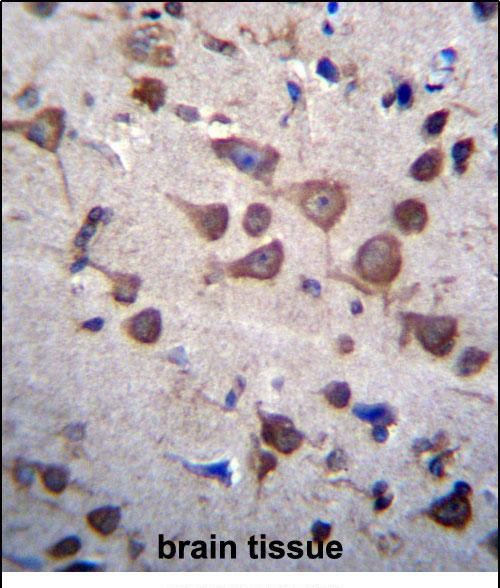

| WB | 1/1000 | Human,Mouse,Rat |
| IF | 咨询技术 | Human,Mouse,Rat |
| IHC | 1/100-1/500 | Human,Mouse,Rat |
| ICC | 技术咨询 | Human,Mouse,Rat |
| FCM | 咨询技术 | Human,Mouse,Rat |
| Elisa | 咨询技术 | Human,Mouse,Rat |
| Aliases | Phosphatidylinositol N-acetylglucosaminyltransferase subunit A, GlcNAc-PI synthesis protein, Phosphatidylinositol-glycan biosynthesis class A protein, PIG-A, PIGA |
| Entrez GeneID | 5277 |
| WB Predicted band size | 54.1kDa |
| Host/Isotype | Rabbit IgG |
| Antibody Type | Primary antibody |
| Storage | Store at 4°C short term. Aliquot and store at -20°C long term. Avoid freeze/thaw cycles. |
| Species Reactivity | Human |
| Immunogen | This PIGA antibody is generated from rabbits immunized with a KLH conjugated synthetic peptide between 455-484 amino acids from the C-terminal region of human PIGA. |
| Formulation | Purified antibody in PBS with 0.05% sodium azide. |
+ +
以下是关于PIGA抗体的3-4篇参考文献及其摘要概述:
---
1. **文献名称**:*Deficiency of the GPI anchor caused by a somatic mutation of the PIG-A gene in paroxysmal nocturnal hemoglobinuria*
**作者**:Takeda, J., Miyata, T., Kawagoe, K., et al.
**期刊**:*Cell* (1993)
**摘要**:
该研究首次克隆了人类PIGA基因,揭示了其在糖基磷脂酰肌醇(GPI)锚定生物合成中的关键作用。通过分析阵发性睡眠性血红蛋白尿症(PNH)患者的体细胞突变,证实PIGA基因缺陷导致GPI锚定蛋白缺失,为PNH的分子机制提供了重要依据。
2. **文献名称**:*Diagnosis and management of paroxysmal nocturnal hemoglobinuria*
**作者**:Parker, C., Omine, M., Richards, S., et al.
**期刊**:*Blood* (2005)
**摘要**:
这篇综述系统探讨了PNH的病理机制及诊断策略,强调通过流式细胞术检测CD55、CD59等GPI锚定蛋白的缺失(间接反映PIGA突变),并提及针对PIGA基因的分子检测方法在临床中的应用。
3. **文献名称**:*Mouse PIG-A gene: gene structure and role in the synthesis of GPI anchor*
**作者**:Kawagoe, K., Kitamura, D., Okabe, M., et al.
**期刊**:*EMBO Journal* (1996)
**摘要**:
研究通过构建PIGA基因敲除小鼠模型,发现PIGA缺失导致胚胎致死,证实其在GPI锚定合成中不可或缺,并揭示了PIGA在造血细胞中的特异性作用,为后续疾病模型研究奠定基础。
4. **文献名称**:*Molecular analysis of the PIG-A gene in patients with paroxysmal nocturnal hemoglobinuria*
**作者**:Sugimori, C., Chuhjo, T., Feng, X., et al.
**期刊**:*British Journal of Haematology* (2006)
**摘要**:
通过高通量测序分析PNH患者PIGA基因的体细胞突变谱,发现突变类型与疾病严重程度相关,并探讨了突变细胞克隆的演化机制,为靶向治疗提供理论支持。
---
**注**:PIGA抗体相关研究多集中在基因突变对GPI锚定蛋白的影响,而非直接针对PIGA蛋白的抗体开发。上述文献通过机制或诊断方法间接涉及PIGA功能,临床检测中常用抗GPI锚定蛋白(如CD55/CD59)的抗体辅助诊断PNH。
PIGA (phosphatidylinositol glycan anchor biosynthesis class A) is a gene that encodes a protein essential for the synthesis of glycosylphosphatidylinositol (GPI) anchors. These lipid moieties attach certain proteins to cell membranes, enabling diverse cellular functions, including signal transduction and immune regulation. Mutations in the *PIGA* gene disrupt GPI anchor biosynthesis, leading to deficiencies in GPI-anchored proteins (GPI-APs) on cell surfaces. This defect is central to paroxysmal nocturnal hemoglobinuria (PNH), a rare hematologic disorder where blood cells lacking GPI-APs are susceptible to complement-mediated destruction.
Anti-PIGA antibodies are primarily research tools used to study GPI-AP expression and PNH pathophysiology. They help identify cells with *PIGA* mutations by detecting the absence of GPI-APs (e.g., CD55. CD59) via flow cytometry. While PNH is driven by acquired *PIGA* mutations in hematopoietic stem cells, germline mutations can cause multi-system disorders, such as developmental delays and seizures.
Recent studies explore PIGA's role beyond PNH, including its association with cancer and autoimmune conditions. Anti-PIGA antibodies also aid in investigating GPI biosynthesis pathways and potential therapies, such as complement inhibitors for PNH. Their utility underscores the importance of GPI anchors in cellular biology and disease mechanisms.
×